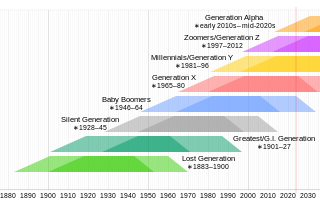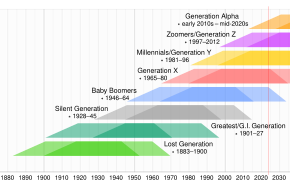
Generation X is the demographic cohort following the Baby Boomers and preceding Millennials. Researchers and popular media often use the mid-1960s as its starting birth years and the late 1970s as its ending birth years, with the generation being generally defined as people born from 1965 to 1980. By this definition and U.S. Census data, there are 65.2 million Gen Xers in the United States as of 2019. Most of Generation X are the children of the Silent Generation and early Baby Boomers; Xers are also often the parents of Millennials and Generation Z.

Baby boomers, often shortened to boomers, are the demographic cohort following the Silent Generation and preceding Generation X. The generation is often defined as people born from 1946 to 1964 during the mid-20th century baby boom. The dates, the demographic context, and the cultural identifiers may vary by country. Most baby boomers are the children of either the Greatest Generation or the Silent Generation, and are often parents of Gen Xers and Millennials.

A generation is all of the people born and living at about the same time, regarded collectively. It also is "the average period, generally considered to be about 20–30 years, during which children are born and grow up, become adults, and begin to have children." In kinship, generation is a structural term, designating the parent–child relationship. In biology, generation also means biogenesis, reproduction, and procreation.

Millennials, also known as Generation Y, are the demographic cohort following Generation X and preceding Generation Z. Researchers and popular media use the early 1980s as starting birth years and the mid-1990s to early 2000s as ending birth years, with the generation typically being defined as people born from 1981 to 1996. Most Millennials are the children of Baby Boomers and older Generation X. In turn Millennials are often the parents of Generation Alpha.

The Silent Generation, also known as the Traditionalist Generation, is the Western demographic cohort following the Greatest Generation and preceding the baby boomers. The generation is generally defined as people born from 1928 to 1945. By this definition and U.S. Census data, there were 23 million Silents in the United States as of 2019.

Generation Jones is the social cohort worldwide of the latter half of the baby boomer generation to the first year of Generation X. The term Generation Jones was first coined by the American cultural commentator Jonathan Pontell, who identified the cohort as those born from 1954 to 1965 in the U.S., who were children during Watergate, the oil crisis, and stagflation rather than during the 1950s, but slightly before Gen X.

Generation Z, colloquially known as Zoomers, is the demographic cohort succeeding Millennials and preceding Generation Alpha. Researchers and popular media use the mid-to-late 1990s as starting birth years and the early 2010s as ending birth years. Most members of Generation Z are the children of Generation X or older Millennials.

Doree Shafrir is an American author and podcast host. She was previously an editor at Rolling Stone, Gawker and The New York Observer and a senior writer at BuzzFeed. She is the author of the novel STARTUP and co-editor of the collection Love, Mom: Poignant, Goofy, Brilliant Messages from Home.
The Strauss–Howe generational theory, devised by William Strauss and Neil Howe, describes a theorized recurring generation cycle in American history and Western history. According to the theory, historical events are associated with recurring generational personas (archetypes). Each generational persona unleashes a new era lasting around 20–25 years, in which a new social, political, and economic climate (mood) exists. They are part of a larger cyclical "saeculum". The theory states that a crisis recurs in American history after every saeculum, which is followed by a recovery (high). During this recovery, institutions and communitarian values are strong. Ultimately, succeeding generational archetypes attack and weaken institutions in the name of autonomy and individualism, which eventually creates a tumultuous political environment that ripens conditions for another crisis.
Neil Howe is an American author and consultant. He is best known for his work with William Strauss on social generations regarding a theorized generational cycle in American history. Howe is currently the managing director of demography at Hedgeye and he is president of Saeculum Research and LifeCourse Associates, consulting companies he founded with Strauss to apply Strauss–Howe generational theory. He is also a senior associate at the Center for Strategic and International Studies' Global Aging Initiative, and a senior advisor to the Concord Coalition.
The working environment has gone through a major transformation over the last decades, particularly in terms of population in the workforce. The generations dominating the workforce in 2024 are baby boomers, Generation X, millennials and Generation Z. The coming decades will see further changes with emergence of newer generations, and slower removal of older generations from organisations as pension age is pushed out. Many reports, including a publication by Therese Kinal and Olga Hypponen of Unleash, warn that understanding differences between the generations, and learning to adapt their management practices is critical to building a successful multigenerational workplace.
A cusper is a person born near the end of one generation and the beginning of another. People born in these circumstances tend to have a mix of characteristics common to their adjacent generations, but do not closely resemble those born in the middle of their adjacent generations. Generational profiles are built based on people born in the middle of a generation rather than those on the tails of a generation. Generations may overlap by five to eight years. As such, many people identify with aspects of at least two generations. The precise birth years defining when generations start and end vary.

Jean Marie Twenge is an American psychologist researching generational differences, including work values, life goals, and speed of development. She is a professor of psychology at San Diego State University, author, consultant, and public speaker. She has examined generational differences in work attitudes, life goals, developmental speed, sexual behavior, and religious commitment.
Satori generation is a Japanese language neologism used to describe young Japanese who have seemingly achieved the Buddhist enlightened state free from material desires but who have in reality given up ambition and hope due to macro-economic trends. The term was coined around 2010. The Satori generation are not interested in earning money, career advancement, and conspicuous consumption, or even travel, hobbies and romantic relationships; their alcohol consumption is far lower than Japanese of earlier generations. They live in a period of waithood and are NEET, parasite singles, freeters or hikikomori. The Satori generation in Japan is roughly equivalent to the Sampo generation in Korea, and is somewhat similar to the Strawberry generation in Taiwan.

Generation Z, colloquially known as Zoomers, is the demographic cohort succeeding Millennials and preceding Generation Alpha.

Generation Alpha is the demographic cohort succeeding Generation Z. Researchers and popular media use the early 2010s as starting birth years and the mid-to-late 2020s as ending birth years (see § Date and age range definitions). Named after alpha, the first letter in the Greek alphabet, Generation Alpha is the first to be born entirely in the 21st century and the third millennium. Most members of Generation Alpha are the children of millennials.
Cheugy is an American neologism coined in 2013 as a pejorative description of lifestyle trends associated with the early 2010s. This aesthetic has been described as "the opposite of trendy" or "trying too hard". The term has been used positively by some who identify with the aesthetic.

Generation Z, colloquially also referred to as 'zoomers', is the demographic cohort succeeding Millennials and preceding Generation Alpha. Researchers and popular media use the mid-to-late 1990s as starting birth years, while they use the early 2010s as the ending birth years.

Zillennials is the demographic cohort on the cusp of the Millennial and Generation Z cohorts. Their adjacency between the two generations and limited age grade has led to their characterization as a "micro-generation." They are generally the children of Generation Jones and Generation X. Estimates of the U.S. population in this cohort range from 30 million to 48 million.

Millennials, also known as Generation Y or Gen Y, are the demographic cohort following Generation X and preceding Generation Z.







